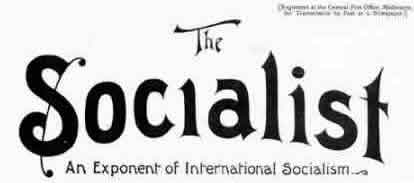To Do or Not to Do - MARAT
The Work and the Way
As a fact I feel repentant. It seems an age since
I penned a column to please my soul. Deterioration is so easy. One has
only to drift. Do you know, there is no foe so insidious as one’s
own readiness to please – others. People will point to a work which
is so intensely practical; its performance will evoke so much public praise;
and there is a reputation for sanity to be gained. And, perhaps, one may
be requisitioned to a position of prestige and – salary. Verily
the voice of the corrupter pleadeth gently! Submission is not difficult,
though memory may be otherwise. And so now and again we call up the spirit
we put to sleep, and bid it affirm the ‘truth’, and nothing
but the truth,” even as ‘twere ourselves when we were true.
In this world we perceive men exploited by men;
but why talk about it? Does not the statement involve social changes detrimental
to established dominion? Alterations are desirable when you are disadvantaged
– not, no, not otherwise. If you are a member of Parliament, or
a Union Secretary, or whatever you are, so long as you are receiving more
than you justly earn, then it is not in the public interest that you seek
to upset things. “Let sleeping dogs lie,” lest they tear your
trousers.
But the fact still remains, does it not, that ninety
and nine they work and die so that one may have opulence and too much,
while the ninety and nine have too little. And it is also a fact; is it
not, that the aforesaid exploitation of man by man is the root cause of
the frightful inequality and wrong. And it is also a fact, as I have heard
said, that if those who knew the cause would only explain the cause to
those who did not know, then – Ah, then! There would ensue correction!
So that the remedy for our social disorder
is knowledge. Then, my friend who is looking after my career urges the
appointment of a National Council of Education. He would have me devote
myself to the awakening of a popular appreciation of art; he counsels
classes in technical handicraft, and is not above, or below, the establishment
of libraries and singing classes. “Let the people read Shakespeare,”
he will loudly assert, as though poverty proceeded from the wrong choice
in dramatists. And as my career is the thing, I will study the various
educational systems, and pose as a Solomon in my criticism of our "backwardness
in education."
|
|
But, somehow, I feel, in fact I know, that the before-mentioned
ninety and nine will not have even become ninety and eight -–but
still the career is the thing!
But if we did not care a damn for the career, wouldn’t
it be fine to challenge my advocate of education to give as much attention
to the economics of society as he does to the elements of music? Could
we not roast him on the grid-iron of fact and logic? Would it not be splendid
to inform him of the history of human evolution; to tell him of the wonderful
work the village blacksmith has done for civilisation, and to demand that
the village blacksmith be clothed in fine raiment instead of rags, because
the village blacksmith has wrought so patiently?
Knowledge! Ah, yes! But let it have relevancy to
the fundamental. The chemist does not use the Bible as a text-book; nor
does the parson ponder a manual of engineering. The working-class are
not ignorant over the entire field of knowledge. Every man and every woman
comprehends some special department sufficiently well to work it. The
most ignorant Sociologist I know is a crack football captain; the least
interesting conversationalist may be an expert pianist. The working-class
do not suffer because they are unable to read Livy, or because they only
know Homer as the translations state him. No! They suffer because of capitalist
exploitation. They will cease to suffer when exploitation ends. Hence
the great counsellor of the working-class is not the man who will open
the Universities. He is the man who will give to the people the proper
point of view. Let us have demagogues. Let us substitute for the musician
the madman – so-called. And let us supplant the practical reformer
with the impossibilist – so-called.
Knowledge is essential. A career, save the mark,
is also essential. If I choose the latter the multitude would be wise
to possess the former. In my career I will talk to the many about topics
of general interest. It is, of course, not to be expected that I will
expound principles aiming at the disestablishment of the social system.
The many would be wise to insist upon it; but I have my career to consider.
I wonder how much longer my career is to remain the chief concern of the
ninety and nine, and I also wonder how much longer the ninety and nine
will remain the stepping stone for my pushful barrow. |
